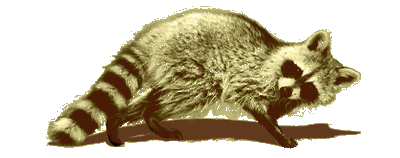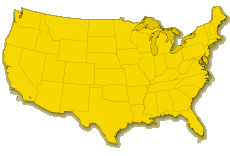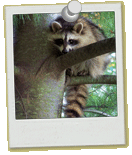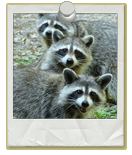RACCOONSProcyon lotor
GENERAL INFO: These "bandit masked" animals are very adaptable and thrive in all habitats, including urban areas. They will eat whatever is available to them and will live just about anywhere, including your attic, crawl space, or under/in your shed. They can grow up to 20 lbs. (some northern specimens can weigh up to 40-50 lbs!) and are extremely intelligent. You should be very careful when dealing with raccoons on your property as they can be very aggressive, especially when cornered, using their teeth and sharp claws to attack and defend themselves. Females protecting their young are extremely vicious. THREAT: Raccoons commonly enter a house through already existing access points such as holes in soffits or other areas, like your chimney. They can tear their own hole through most common building materials as well. Once in the house, they will chew through wiring if it is in the way of where they want to nest. This can create a dangerous fire hazard. They will tear up insulation and AC ducts to create a den site. The Round Worm (Baylisascaris Procyonis) parasite, commonly present in its waste, can also pose a threat to humans. If the eggs of round worms are ingested by humans and are untreated, they can cause nausea, organ failure, or worse. Extreme caution should be taken when you suspect raccoons and their excrement are in or around your house. The round worm eggs are very resilient and can be spread on building materials, soil and water runoff. Raccoons are also known to carry a wide variety of diseases, including distemper and rabies. Rabies is transmitted through saliva from the infected raccoon to pets and humans. Unvaccinated pets are particularly at risk. REMOVAL / PREVENTION: Limit their food sources, get safety lid garbage cans or bungee cord them closed. DO NOT FEED THEM. The removal of an entire family of raccoons in an attic or chimney space is a dangerous and costly endeavor, so doing your part to discourage their foraging on your property can save you a lot of grief. IMAGES: Click for larger image. GENERAL CAPACITIESPhysical Strength: Resilience: Speed: Aggressiveness: Health Threat: Property Threat: Breeding / Propagation: GEOGRAPHIC RANGE
AVG. BREEDING RATEUp to DID YOU KNOW?Raccoons in the wild only have a life expectancy of 1 to 3 years, depending upon the conditions (i.e. human traffic, hunting, weather severity, etc.) However, in captivity they can live for over 20 years! Raccoons are also known for their intelligence, able to learn abstract principles for such things as locking mechanisms for doors and other common barred entrances. Some studies have shown raccoons can also remember how to do specific tasks for a period of up to 3 years. Raccoons are found on multiple continents and locales, from North America, Europe to Asia, even in Japan (due to irresponsible importation of the animal)! |
||



